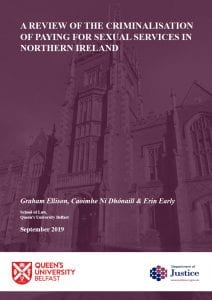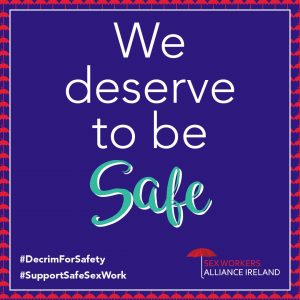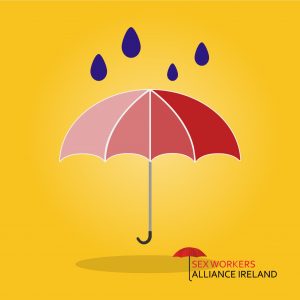
“Since the Gardaí have apprehended the criminals who attacked and robbed workers in Roscommon and Dublin we have learned of other attacks by criminal gangs. Again, because of the massive distrust in Gardaí, sex workers will not report” she continued.
“We have also begun to hear of workers being contacted by men who are offering security. The law has created a space where pimps can flourish. Pimps are using the increased number of violent attacks on workers to attempt to line their pockets. Both the attacks and pimps are the direct consequence of sex work laws.
Sex workers are not legally allowed to work together for safety. Attackers know that if workers are working together it is considered a brothel. Sex workers who work together are very unlikely to report to the Gardaí because they fear arrest. If a sex worker works alone this can make her more vulnerable to attacks. Sex workers working alone are reluctant to report to the Gardai because they fear that Gardaí will surveil them looking for their clients, or they won’t be believed. Criminals know this and target both workers alone or together.”
She also voiced concerns about the raids that occurred last week, in the third day of action by the Gardaí this year. “This week we have also learned of more raids and questioning of clients. Raids like these will decrease the numbers of clients who seek the services of workers, which is their aim. But with mounting Christmas expenses workers, many of whom are single mothers, will be forced to take more risks in order to make ends meet. How can the state claim to keep women safe if they are pushing us into more risky situations?”
SWAI was disappointed to learn that The LGBTI+ Inclusion Strategy released today has no inclusion of sex workers. Kate said “The LGBTI+ community make up a significant portion of sex workers in Ireland. Whether you support sex workers rights or not, it is a massive oversight not to include us in the Inclusion Strategy, especially at a time when chemsex and HIV diagnosis are on the rise. Trans sex workers make up 61% of the number of trans people who have been killed globally this year. Ignoring sex workers in the LGBTI+ community is ahistorical, we have always been central to the fight for LGBTI+ rights. Sex workers threw the first brick at Stonewall!
But SWAI was heartened to see IHREC’s inclusion of our sex work laws as a barrier to justice for sex workers, especially migrant sex workers. Our sex work laws are applied in a racist way, with young migrant women feeling the brunt of the law. Almost all of the sex workers prosecuted for working together for safety have been migrant women. We are concerned about due process as sex workers are routinely arrested, prosecuted and convicted with Gardaí acting as prosecutors. The criminalisation of any aspect of sex work, including client criminalisation, has had a detrimental effect on the lives of sex workers, many of whom are already marginalised. Bodily autonomy and privacy are human rights but these rights are routinely breached for sex workers because of the law. We join the Irish Human Right and Equality Commission in calling for a review of our sex work laws. SWAI insists that current sex workers be listened to in the review in 2020. Our stories are important evidence that the law is not fit for purpose.
We encourage workers who have been victims of a crime to come forward. We know that when we work together with Gardaí we can make Ireland a safer place. We need to decriminalise sex work so that workers will feel that the Garda will work with them in prosecuting their attackers. We all want the law to keep us safe.”
#DecrimforSafety #SupportSafeSexWork

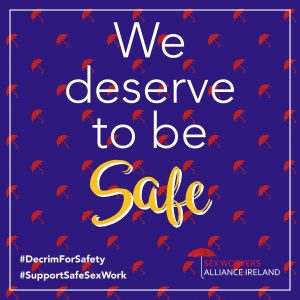
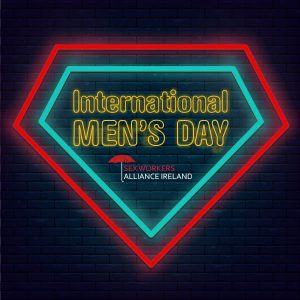 Men ignored by sex work law because it does not suit the ‘helpless victim’ propaganda, says university expert
Men ignored by sex work law because it does not suit the ‘helpless victim’ propaganda, says university expert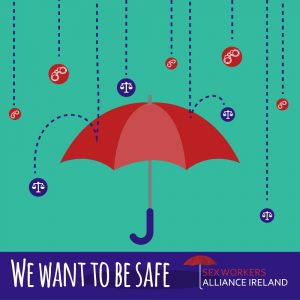 Both sex workers and Gardaí have known about these criminals for some time but sex workers refuse to contact the Garda because trust in Gardaí is at an all-time low since the law changed in 2017.
Both sex workers and Gardaí have known about these criminals for some time but sex workers refuse to contact the Garda because trust in Gardaí is at an all-time low since the law changed in 2017. 
